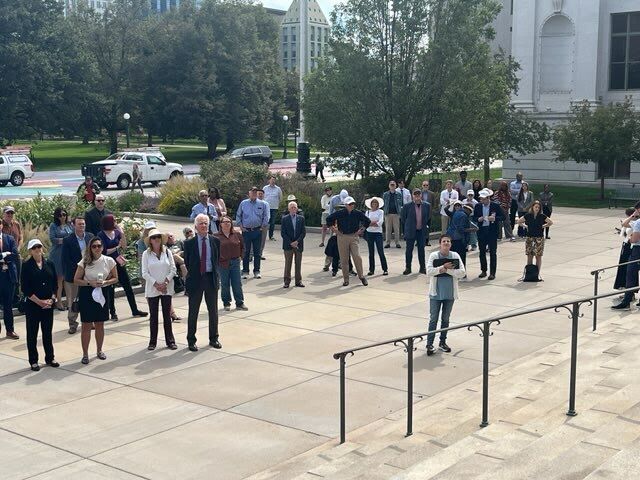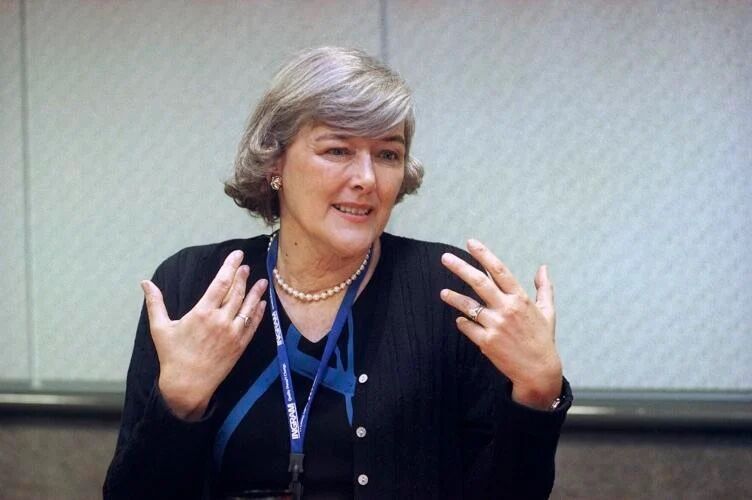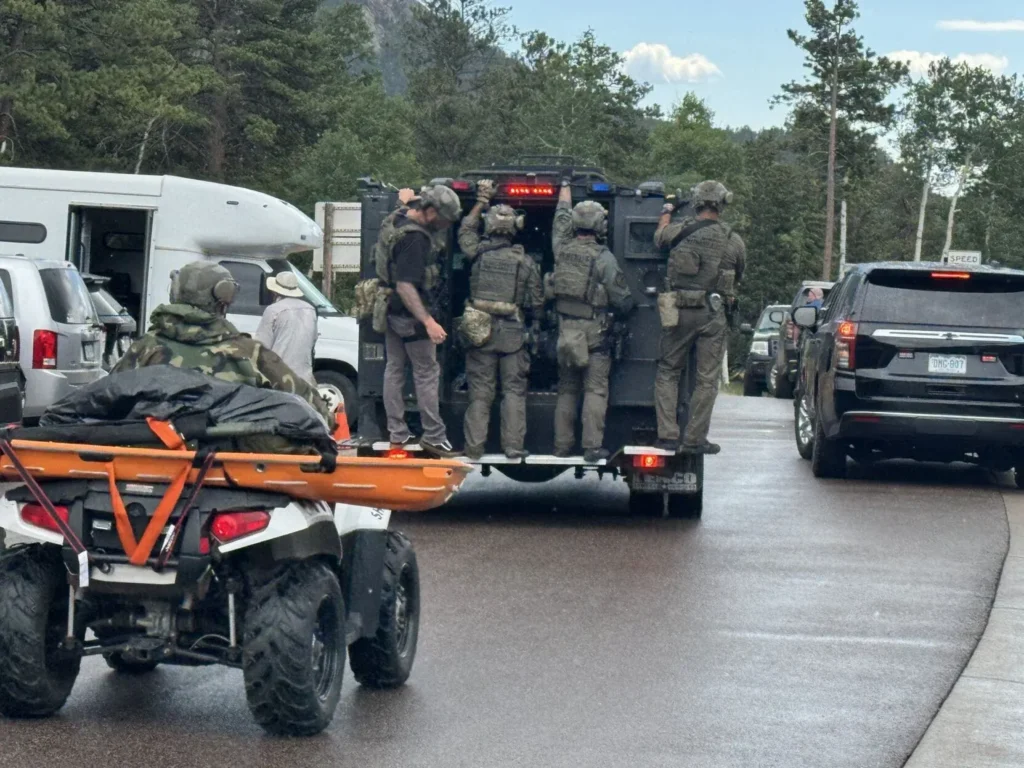Ford Amphitheater developer, officials announce new sound measures — but there could be a wait
Enhanced mitigation measures designed to tamp down noise at the new Ford Amphitheater, whose debut last summer near Gleneagle generated hundreds of complaints from area residents objecting to what they called unwanted and obtrusive sound from the outdoor concert facility, were announced by Colorado Springs Mayor Yemi Mobolade’s office and VENU, the Springs-based entertainment company that developed the amphitheater.
The mitigation steps are part of what the city and VENU have called the “2025 Ford Amphitheater Mitigation and Monitoring Agreement,” which they said came in response to feedback from neighborhoods near the 8,000-seat amphitheater.
The open-air facility, which VENU envisioned as a scenic setting for concerts by top artists and entertainers and that was approved by the City Council in January 2023, was built as part of the Polaris Pointe mixed-use development, southwest of North Gate Boulevard and Voyager Parkway. It opened Aug. 9.
The mitigation efforts, detailed in statements and documents released late Tuesday by the city and VENU, include upgrades the company already indicated it would make at the amphitheater, such as the construction of additional noise walls and changes to the facility’s sound system.
Documents show, however, it could be several months, and as late as October, until those improvements are completed.
One new mitigation measure apparently was designed to address one of the most controversial aspects of the amphitheater’s inaugural season.
Before the Ford Amphitheater’s first concert, the city issued a noise hardship permit that allowed the venue to exceed Colorado Springs’ sound limits of 50 decibels between 7 p.m. and 7 a.m. in residential areas.
As part of the new agreement announced Jan. 28, VENU requested another noise hardship permit for the amphitheater’s 2025 season.
In an agreement addendum, Mobolade and the Colorado Springs Police Department acknowledged VENU continues to meet the city’s noise hardship permit requirements. As a result, the hardship permit was approved. It would begin April 15 and extend through Oct. 31.
But now, the permit’s coverage area will be limited to the boundaries of the 200-acre Polaris Pointe development, including adjacent apartments and businesses. The “limited noise hardship permit” also requires VENU to comply with terms of the new sound mitigation and monitoring agreement.
It remains to be seen whether a “limited noise hardship permit” and other mitigation steps in the agreement are enough to satisfy residents upset about amphitheater noise.
Complaints about noise began immediately after the amphitheater’s first concert, some of which came from homeowners 4 to 5 miles away. Dozens of those same residents also showed up at City Council meetings to voice their displeasure.
As recently as December, Mobolade and City Council President Randy Helms conducted a public “listening session” and fielded yet more complaints.
A City Council-commissioned report by a noise consulting company, released in November, said that a trio of concerts studied by the consultant roughly complied with city requirements for limiting noise. Still, the report found those shows were clearly audible in many neighborhoods and would have been too loud for residential areas if the amphitheater hadn’t received its hardship permit.
Mobolade, in a statement that accompanied Tuesday’s release of the new city-VENU agreement, said he’s “optimistic about the outcome of the planned mitigation and monitoring efforts, and we will be watching the results closely throughout this season.”
JW Roth, VENU’s founder, chairman and CEO, reiterated comments that his company and the Ford Amphitheater want to be “great neighbors, and that promise remains at the heart of everything we do.”
Roth added that he “fully supports” the limit on the hardship permit’s coverage area. “I made Colorado Springs a vow that I intend to keep: my goal is to ensure you’ll need to buy a ticket to enjoy the concert. While this process has taken time, it’s allowed us to get things right. I’m grateful that we have a clear understanding of how sound will be monitored, what constitutes a violation, and how enforcement will work.”
According to the agreement, news releases and other documents released Tuesday by the city and VENU:
• The company’s original sound mitigation efforts included construction of a minimum 28-foot tall noise wall on the east side of the amphitheater’s lawn seating area, which was designed to serve as a sound barrier. Now, VENU will construct sound walls at the north and south ends of the lawn area. It also will build a sound tunnel system at the entry to the facility that’s designed to redirect sound away from neighborhoods.
• VENU also says it will make “substantial changes” to the amphitheater’s sound system, which include “configuration and equipment that will significantly reduce the sound leaving the amphitheater.”
• According to the noise hardship permit addendum, however, VENU will need “additional time to complete the further mitigation set forth in the 2025 agreement, including design and construction of additional sound walls, implementation of additional sound monitoring equipment, and optimizing, directional placement, and testing of loudspeakers depending on type of performance, etc., estimated for completion by October 31, 2025.”
• Two noise monitoring stations originally were installed by VENU outside the facility. Now, VENU will install three additional sound monitoring stations “inside or adjacent to nearby neighborhoods where complaints were registered.” The agreement itself says those locations will be agreed upon by the city and VENU “in consultation with sound professionals.“
To obtain accurate records of how sound is being experienced and to comply with City Code, the City Council’s approved development plan from January 2023 and standard sound measurement practices, “monitoring stations will track ambient noise prior to a performance and during each show” and “reports will isolate and disregard sudden extraneous sources,” such as emergency sirens and wind. “All five monitoring stations will report in real-time to the amphitheater’s front of house where the audio-visual operations team can make adjustments. This also allows for a clear determination on whether excess (decibels) are associated with performances.”
• The new city-VENU agreement “commits that the venue must maintain a sound level that is at or below city statute levels or average ambient readings at that location, whichever is higher. If sound levels during any concert at the Ford Amphitheater exceed the established limit by (six decibels) or more at two or more monitoring locations, it will be deemed a violation. In such cases, VENU will be subject to financial penalties per occurrence to the city and required to develop a plan for additional mitigation at the affected locations.” The company has agreed to pay the city $500 per occurrence.
The purpose of this provision is to account for unexpected ‘spikes’ in concert noise, and VENU acknowledges that $500 is a reasonable approximation of the city’s costs in reviewing and addressing such ‘spikes.'”











